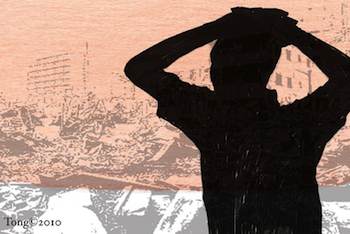- MENU
- HOME
- SEARCH
- WORLD
- MAIN
- AFRICA
- ASIA
- BALKANS
- EUROPE
- LATIN AMERICA
- MIDDLE EAST
- United Kingdom
- United States
- Argentina
- Australia
- Austria
- Benelux
- Brazil
- Canada
- China
- France
- Germany
- Greece
- Hungary
- India
- Indonesia
- Ireland
- Israel
- Italy
- Japan
- Korea
- Mexico
- New Zealand
- Pakistan
- Philippines
- Poland
- Russia
- South Africa
- Spain
- Taiwan
- Turkey
- USA
- BUSINESS
- WEALTH
- STOCKS
- TECH
- HEALTH
- LIFESTYLE
- ENTERTAINMENT
- SPORTS
- RSS
- iHaveNet.com
Andres Oppenheimer

President Barack Obama and other world leaders reacted swiftly to the devastation that hit Haiti in the first days after the earthquake that may have left up to 50,000 dead. But, considering the magnitude of the tragedy, what they have offered so far is peanuts.
Obama's first pledge Thursday of $100 million, Britain's$10 million, Spain's $4.3 million, China's $1 million are a tiny percentage of what will be needed to rebuild Haiti. Even the $550 million requested by United Nations Secretary General Ban Ki-moon may be less than 10 percent of the cost of Haiti's reconstruction, international disaster relief experts tell me.
To put things in perspective, when Hurricane Mitch hit Central America in 1998 and caused 9,000 dead -- a small fraction of those feared dead in Haiti -- the international community ended up forking out $6.3 billion.
Will the world be as generous with Haiti as it was with Central America? Obama, in an emotional address from the
But among diplomats and aid experts, I see a lot of anxiety about the future. Many fear that the world could soon turn its back to Haiti because it doesn't have the diplomatic or strategic importance of other countries that have received massive long-term disaster aid in the past.
Consider the Hurricane Mitch example. At that time, the United States and other major donor countries were committed to preventing Central America from unraveling after they had put so much time and money into the process to end the wars in Nicaragua and El Salvador. The Central American wars had been at the center of the world's East-West conflict in the 1980s.
So when Hurricane Mitch hit the region
By comparison, when four tropical storms crippled Haiti's economy in 2008 and caused damage that the U.N. estimated at $900 million, it took international donors nearly a year to meet and pledge $353 million.
"I'm worried," says Mark Schneider, a former
"Given the magnitude of the devastation, the kind of immediate massive response that we have seen during the life-saving stage has to be followed by the largest long-term development investment ever made to a single country in this hemisphere."
How much money will be needed? Dora Currea, head of Caribbean countries at the Washington, D.C.-based
Francis Ghesquiere, the
Another senior official from an international financial institution, who asked to remain anonymous, told me that the current effort will last one year. "I'm afraid that, after that, people will forget. Haiti's tragedy is that it doesn't have the political weight to draw the world's attention in a sustained manner," he said.
My opinion: Now is the time for the United States and the world community to take concrete steps to ensure that Haiti -- to use Obama's words -- is not forsaken nor forgotten.
The Obama administration's announcement late Friday that it will grant a temporary immigration status to the more than 100,000 undocumented Haitians living in the United States was a good step, which will produce a steady stream of family remittances to Haiti.
But some long-term measures will be needed, including -- as proposed in my last column -- creating an international monitoring commission to make sure that the aid to Haiti is not plundered, so that international donors are encouraged to be more generous.
More important, Haiti will need a global version of the 1948-1952 U.S. Marshall Plan for the reconstruction of Western Europe after World War II.
And it will have to be launched right away. You and I know that pretty soon the Haiti story will fade from the headlines, replaced by the next celebrity tragedy or international political crisis.
If not done now, it won't happen.
WORLD | AFRICA | ASIA | EUROPE | LATIN AMERICA | MIDDLE EAST | UNITED STATES | ECONOMICS | EDUCATION | ENVIRONMENT | FOREIGN POLICY | POLITICS
Haiti - Haiti Needs a Version of the Marshall Plan